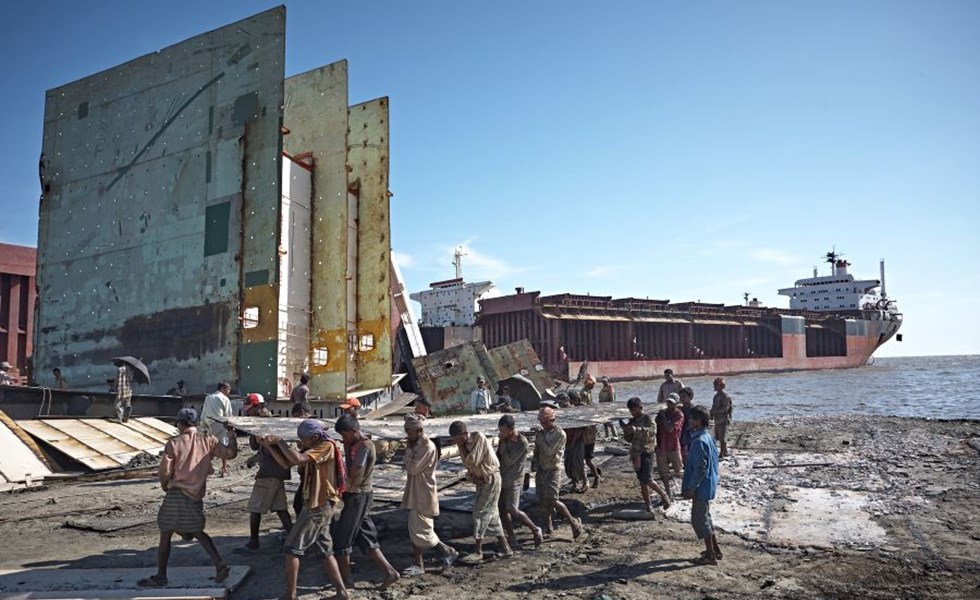Time line towards safer shipbreaking and the Hong Kong Convention

Foto: iStock/Salvador Campillo Alba
2003 - Mondiaal FNV supports IndustriALL’s shipbreaking project
Mondiaal FNV has begun its financial support of the global trade union confederation IndustriALL. The support is intended for a project aimed at responsible shipbreaking, starting with shipyards in India. The project has been launched because shipbreaking is one of the world’s hardest occupations, with many accidents occurring, and shipyards and governments that do next to nothing to improve the situation.
2009 - Drawing up the Hong Kong Convention
In Hong Kong, delegates from shipping and shipbreaking countries discussed an expansion of the Basel Convention, which controls the international trade in hazardous wastes and certain other wastes. It was decided to draw up a separate convention because shipbreaking is such a specific area. The convention was intended to come into force in 2025, provided that at least fifteen countries had ratified it. This would be no simple task, because responsible shipbreaking involves additional costs.
2009 - IndustriALL project extended to Bangladesh and Pakistan
The project was now covering the three countries where most ships were being demolished.
2010 - Mondiaal FNV visits a shipyard in Mumbai
Together with an FNV trade union official and active trade unionists, Mondiaal FNV visited a shipbreaking yard in Mumbai, in India. Later, Mondiaal FNV gave a presentation on the subject.
2012 - Start of FNV safety training courses
The visit and presentation resulted in a plan to start organising safety training at shipbreaking yards in South Asia. The training courses were developed in 2011 and, starting in India, Joop van Oord and other FNV active trade unionists provided training sessions almost every year from 2012 onwards. The training led to demonstrably safer working conditions, greater risk awareness, and an increase in membership numbers in local trade unions.
2015 - Indian shipyards certified
Four shipyards in Alang, the largest shipbreaking location in the world, were the first to be certified for meeting the safety and sustainability requirements of the Hong Kong Convention. Kan Matsuzaki of the global trade union federation IndustriALL called it a ‘concrete step towards protecting the lives of workers at shipbreaking yards.’
2016 - Dozens of deaths at Pakistani yard
The Aces oil tanker exploded at the Pakistani Gadani shipyard, the third largest in the world. The ship was being decommissioned at the time. Dozens to hundreds of workers - the exact numbers have never been known - were killed. When the shipbreaking operations were resumed one year later, the Aces caught fire again. Pakistan and Bangladesh were lagging behind India in terms of safe and healthy working conditions.
2017 - Trade unionists from eighteen countries gather in Rotterdam
Trade union representatives and activists from eighteen seafaring nations and countries with shipbreaking yards gathered on the SS Rotterdam in the Dutch city of Rotterdam for a meeting hosted by FNV Metaal and Mondiaal FNV. The importance of ratifying the Hong Kong Convention was emphasised. Together with Indian unions, Mondiaal FNV visited the Royal Association of Netherlands Shipowners (Koninklijke Vereniging van Nederlandse Reders) and the Dutch Ministry of Infrastructure and Water Management to discuss, among other things, the Hong Kong Convention.
2019 - The Netherlands and India ratify the Hong Kong Convention
In February, the Netherlands became the eighth country to ratify the Hong Kong Convention, followed by India in November, making India the first of the large shipbreaking countries to join. V.V. Rane of Alang Sosiya Ship Recycling and General Workers' Association (ASSRGWA), the largest Indian trade union in the sector, called it a ‘resounding victory’. Kan Matsuzaki of the global trade union federation IndustriALL called on China, Bangladesh, and Pakistan to follow the Indian example.
2020 - First FNV online safety training
In addition to a safety training course that shipbreaking workers could take online, the FNV developed a train-the-trainer manual, which is translated one year later in the local languages Urdu, Bengali and Hindi.
2023 - Hong Kong Convention ratified by enough countries at the last minute
When Bangladesh and Liberia ratified the Hong Kong Convention in June, the conditions for the convention to enter into force were met just in time, with four Bangladeshi shipyards meeting the requirements. IndustriALL’s Kan Matsuzaki stressed that, as well as technical changes, social changes such as freedom of association would also be needed, especially in Bangladesh, which had a particularly poor reputation in this respect.
2025 - Hong Kong Convention coming into force
The Hong Kong Convention will officially come into force on 26 June 2025.